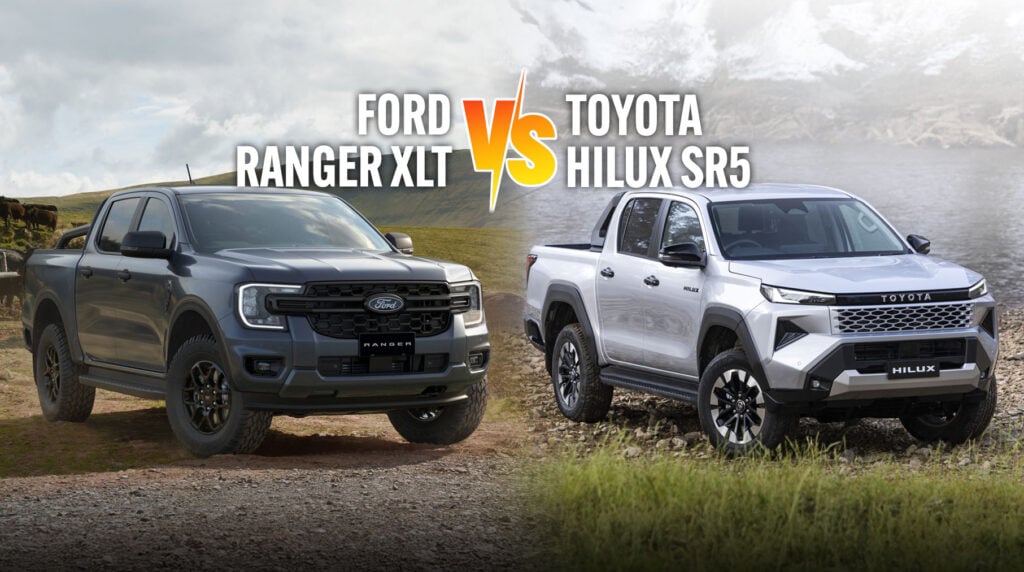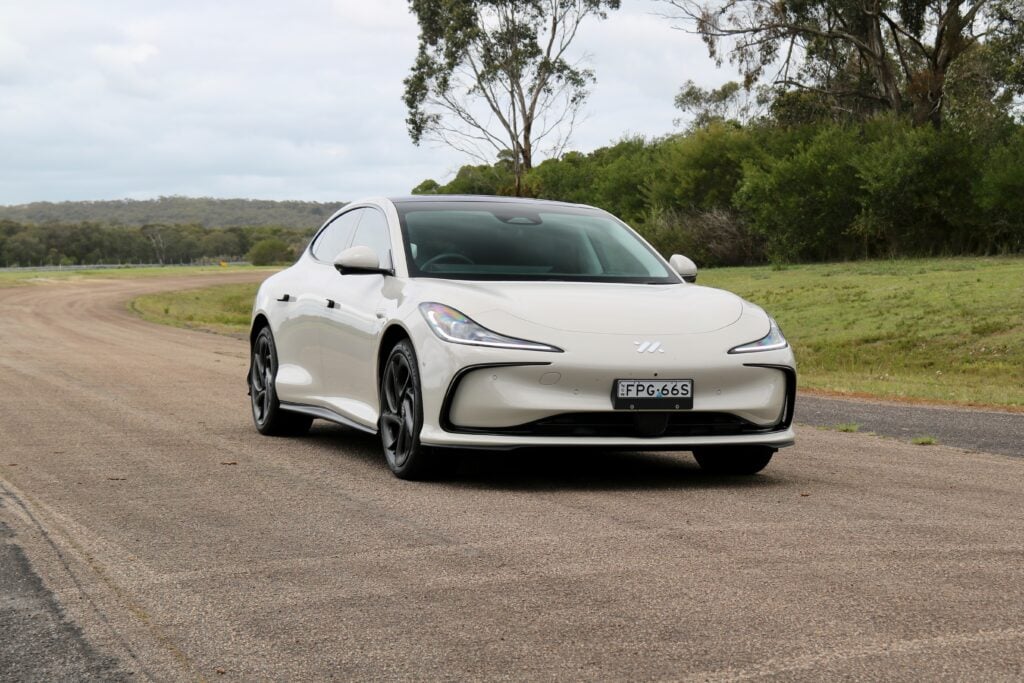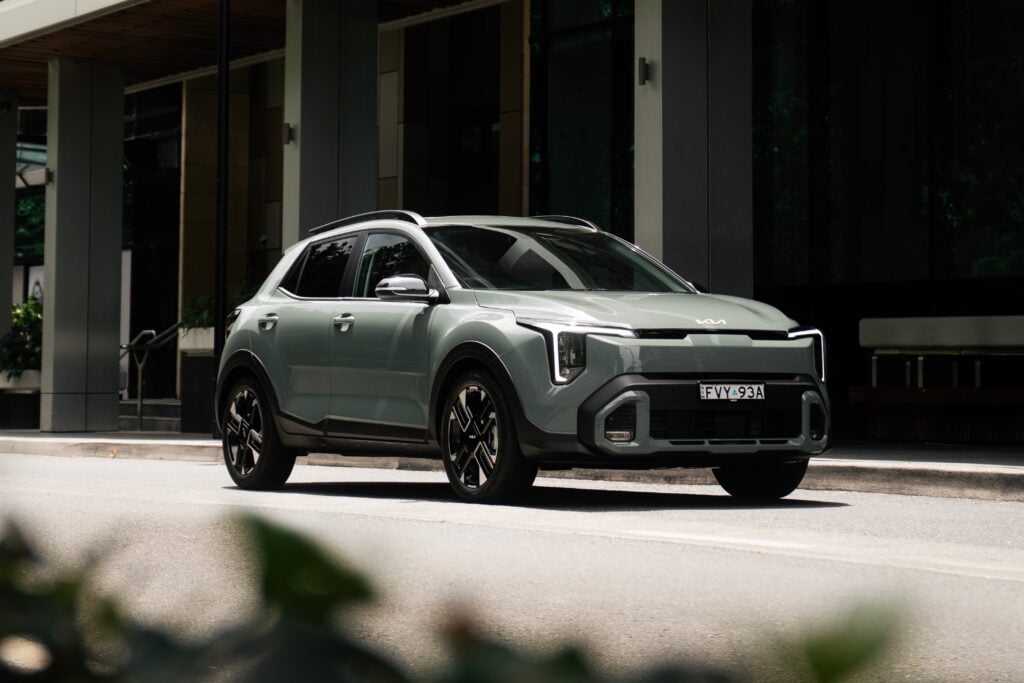Score breakdown
Things we like
- Rear-wheel drive, a rarity in the mid-sized van segment
- Increased cargo capacity
- Punchy 2.8-litre turbo-diesel shared with HiLux
Not so much
- Reversing camera distorts at edges
- Two-speaker stereo feels underspecced
- Cup holders suitable for 1.5-litre bottles, less than ideal for coffee or cans
The Toyota HiAce is, simply and truthfully, Australia’s favourite shoebox on wheels.
Notoriously dependable, the HiAce has spent the last half-a-century winning the hearts of couriers, electricians, house-movers and hippie-campers.
Through wisdom shared from father to son, mother to daughter, tradie to apprentice, the box-on-wheels came to be known as the safe bet. Not dissimilar to its boisterous big brother, the un-killable HiLux.
So when the sixth-generation HiAce dropped back in 2019, the first major revision in 15 years, its sleek semi-bonneted not-so-box-like shape was a significant detour from the ways of old.
EDITOR’S NOTE: Since this story was filed, Toyota has confirmed you can now have the HiAce in any colour you like, as long as it’s white.
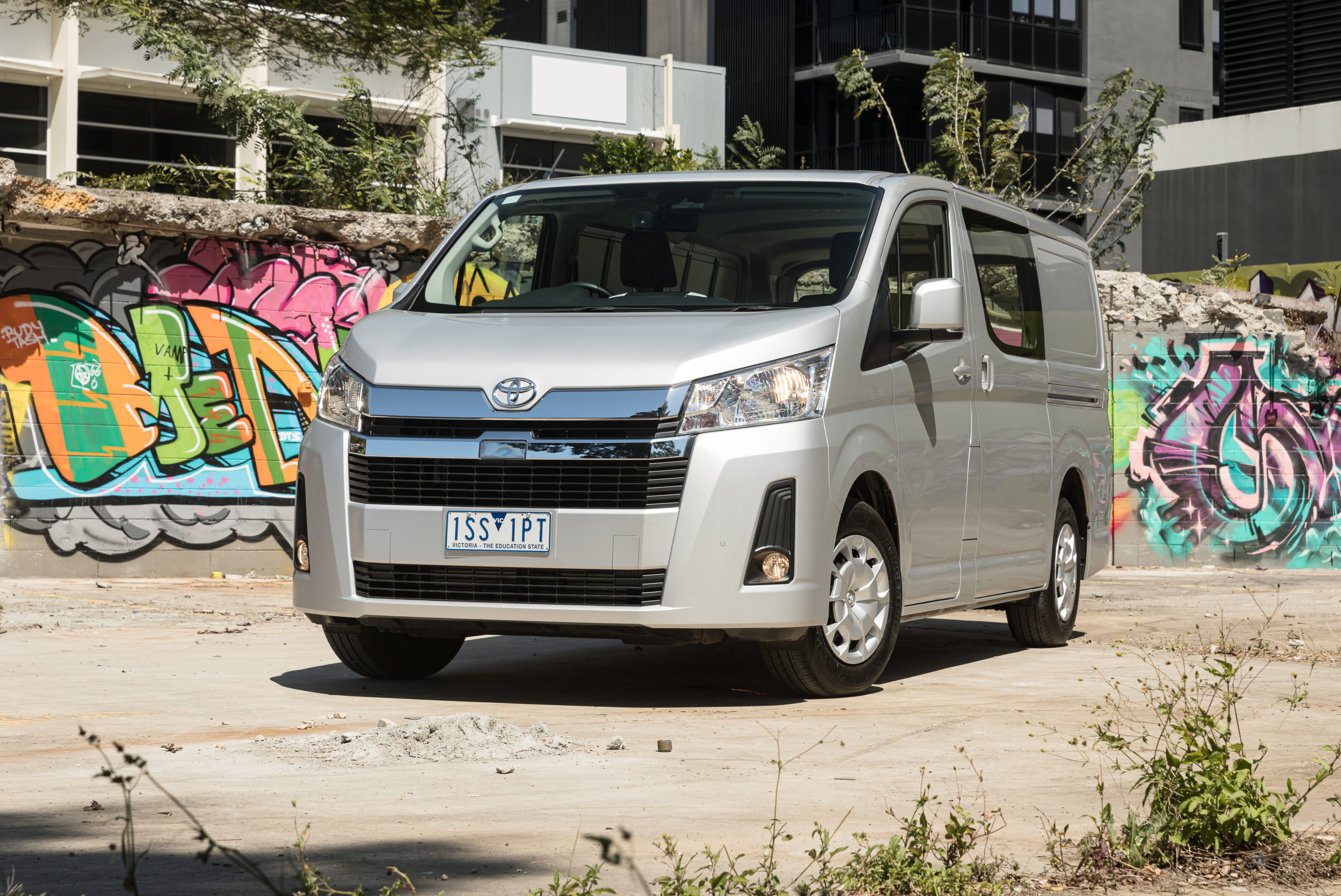
At first glance, the classy redesign looks like a people mover masquerading as a commercial van. Or vice-versa? Who knows, and who cares because it’s a winner.
Toyota clearly spent those 15 long years getting the new model range right, and the sales data confirms it, as the HiAce continues to dominate the mid-sized van segment.
The 2021 LWB HiAce model we tested, compared with the previous generation, brings more tech, more grunt, more cargo space and a five-Star ANCAP safety rating.
The 2021 LWB HiAce, brings more tech, more grunt, more cargo space and a five-star ANCAP safety rating.
The Nitty Gritty
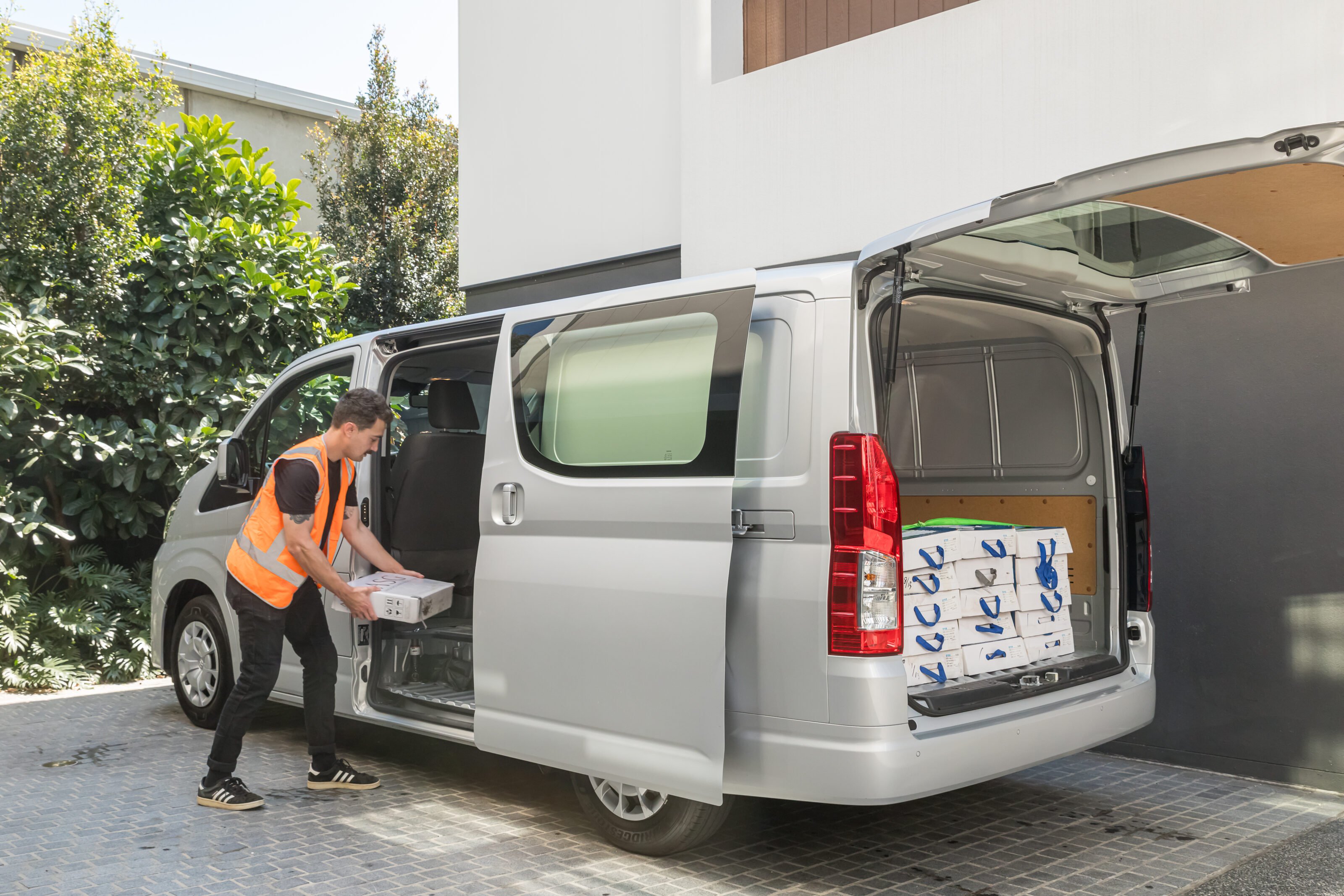
Cargo space is up from the old model, but that’s hardly surprising given it’s an all-round heftier beast.
The LWB HiAce is 570mm longer than its predecessor, at 5265mm from bumper to bumper, which you’d assume is due to the semi-bonneted front. The actual wheelbase itself is longer though, and the track is wider, too.
With a car-park-friendly 1990mm overall height, the new LWB HiAce is only a centimetre taller than the outgoing model but that roof height contributes to the increase in cargo capacity.
A total cargo capacity of 6.2 cubic metres puts it ahead of the old shoebox, but rear length from hatch to front seats has dropped by 470mm to a still-respectable 2530mm. The overall increase comes in the form of a 5mm interior height bump, now 1340mm from floor to roof.
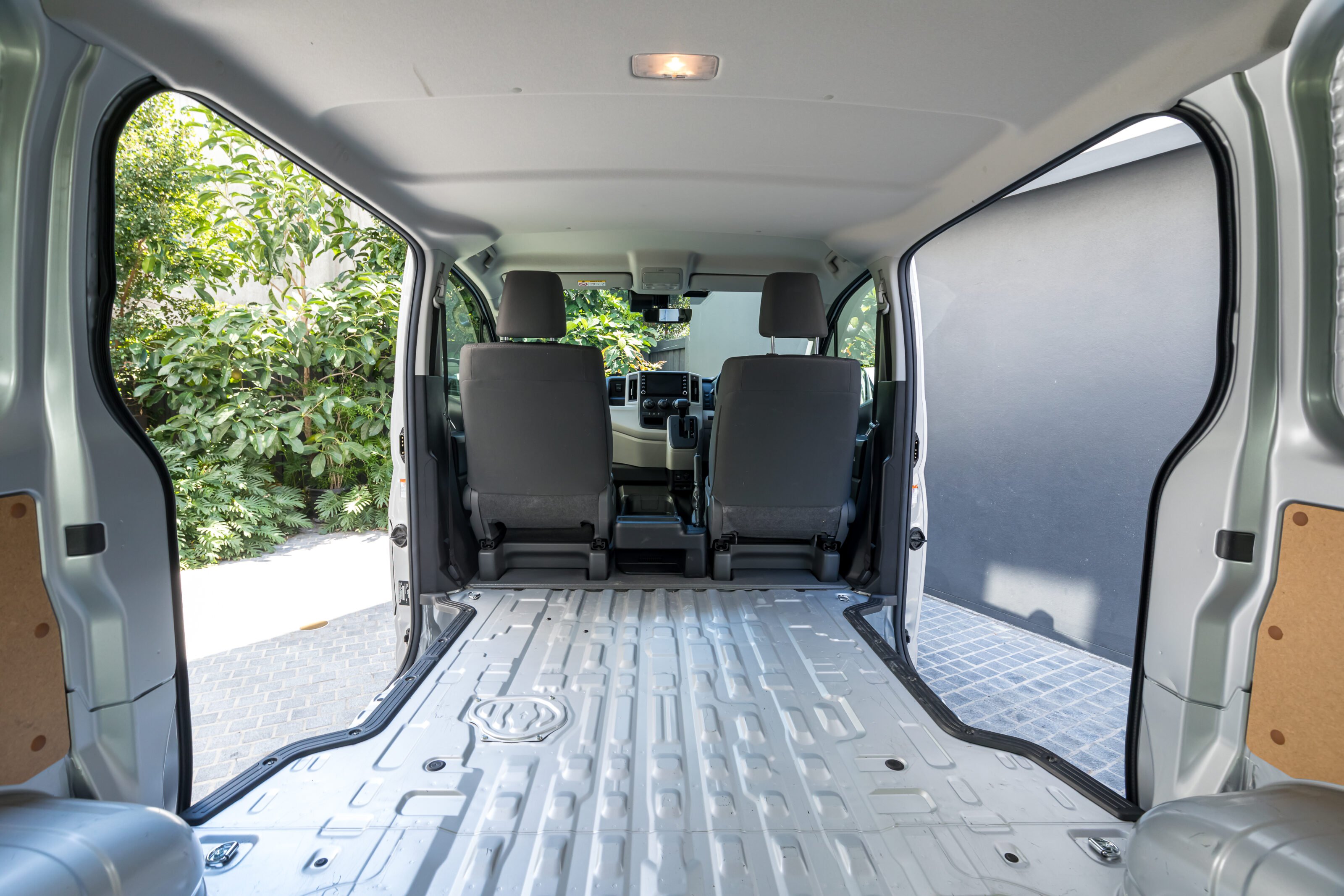
For those of you who are more visual, the increased cargo space will happily accommodate an Aussie pallet between the arches, and thanks to the standard inclusion of dual sliding doors, access has never been better.
The self-shifting LWB HiAce we tested has a kerb weight of 2205kg, which with a GVM of 3300kg, leaves a healthy 1095kg payload including the driver.
A competitive braked towing capacity of 1500kg for the auto, and 1900kg for the manual, gives tradies the option to tow. Mind you, most don’t buy a van to pull a trailer.
Six tie-down points are spaced throughout the rear cargo area, which proved to be plenty for us, although the painted floor would benefit from a non-stick cargo mat if putting the van to work.
How’s it Drive?
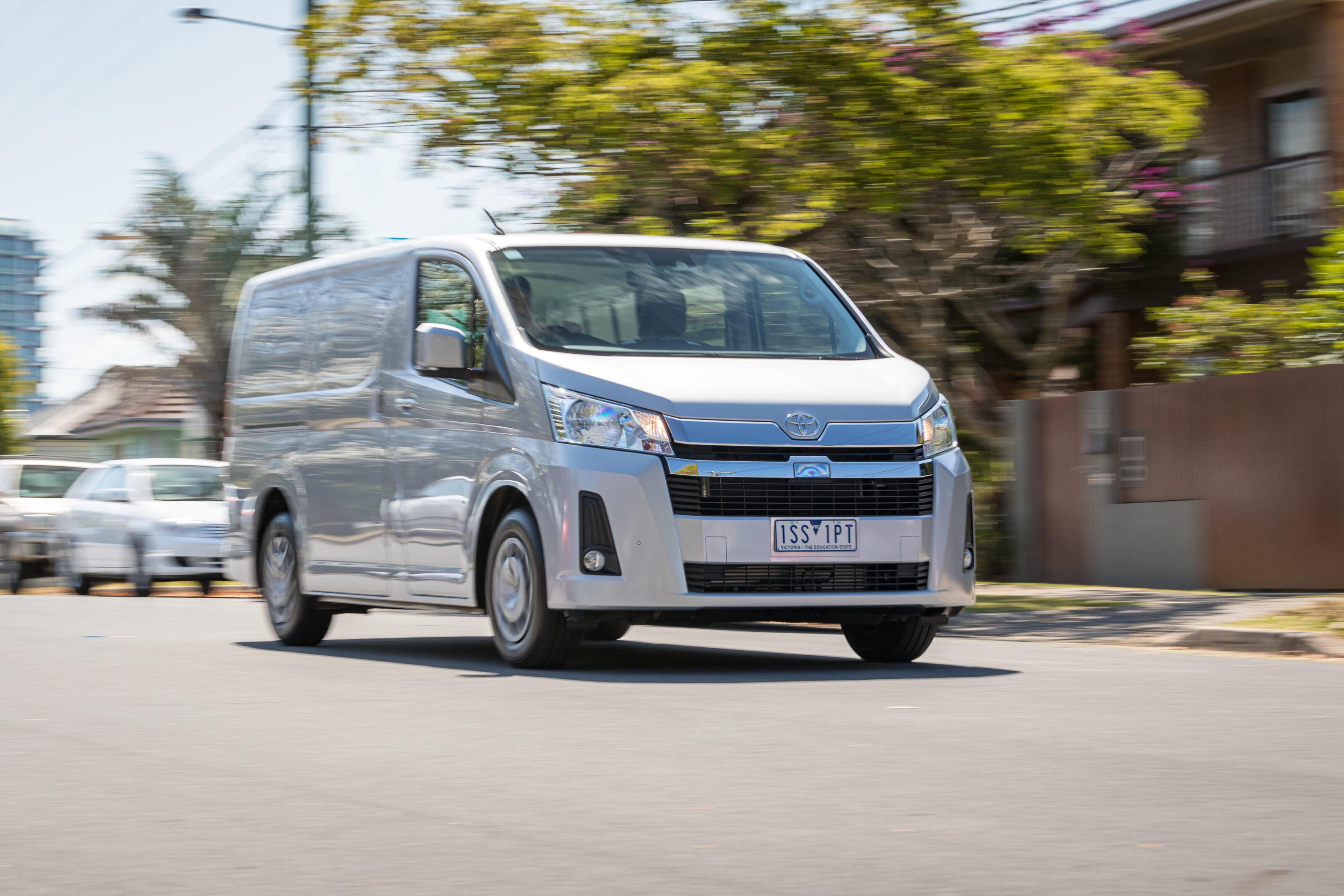
The HiAce was put through our proprietary durability test, which it passed with flying colours.
Across the few hundred kilometres we did, it was all work. Literally, all work. I say that with an air of resentment because the moment ‘mates’ find out about a van test, the empty offers of a “carton to move this”, a “carton to move that”, start flooding in.
Final fuel-use figures landed at 12.8L/100km versus official claims of 8.2L/100km, but it was given a fully-loaded hiding, quite frankly. Very little of the testing was done unloaded, so we’d expect to see that number drop closer to Toyota’s claimed figures with more mixed use.
We had the HiAce filled to the brim with 400kg-or-so of furniture, four times over, as well as transporting heavy loads of façade glass for a construction company, and finally, put to work on a good ol’ dump run. It loved every second of it, performing flawlessly.
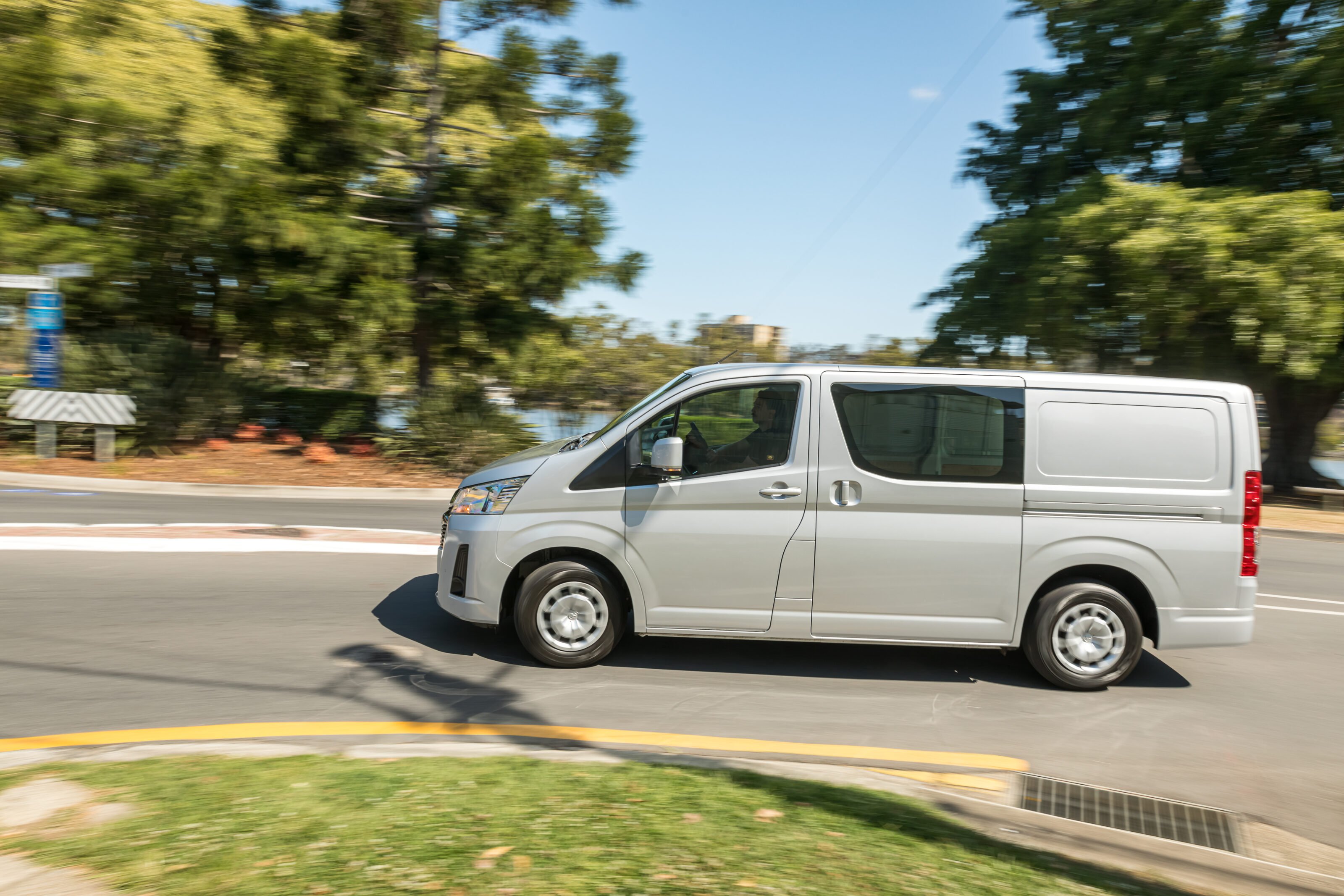
The powertrain is an absolute peach in the HiAce, performing effortlessly loaded right up and punchier than a van has a right to be when running around empty. But we aren’t complaining, because who said vans can’t be a hoot to drive?
It stops on a dime, too, with no real noticeable difference when carrying a healthy load, though naturally, loaded braking is a more gentle exercise.
The Euro-5-compliant 2.8-litre four-cylinder turbo-diesel, lifted from the tried-and-tested HiLux, produces 130kW/450Nm. It’s down on power, ever so slightly, on the HiLux’s 150kW/500Nm tune but it doesn’t hang about, with no discernible turbo lag or cog-confusion from the ‘box.
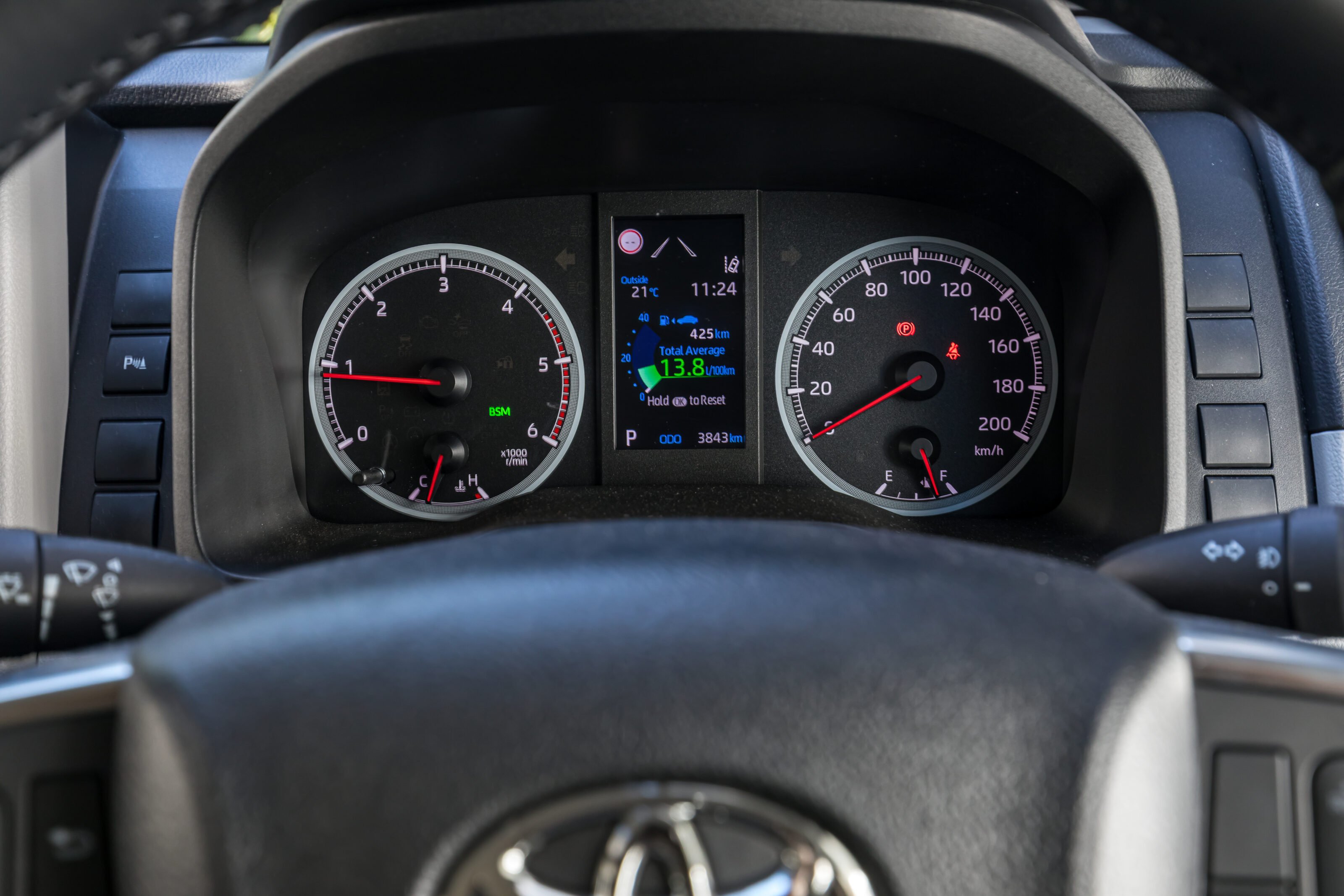
Speaking of the gearbox, the Aisin-sourced six-speed automatic brings the best out of the 2.8-litre diesel donk, offering robust engine braking by holding gears when loaded and perfect gear selection in all the driving scenarios we put it through.
The steering is also top-notch in the HiAce, with 3.5 turns lock-to-lock and an impressive 11-metre turning circle. It’s a real ballerina around town, a cinch to park, and suffers none of the torque-steer typical of front-drive rivals in the van segment.
Its rear-wheel-drive configuration offers benefits beyond a lack of torque steer, with better traction when loaded and no axle tramp whatsoever when empty.
Compared to the predominantly front-wheel-drive van options out there, the rear-driven HiAce puts the torque down more effectively and feels better under acceleration.
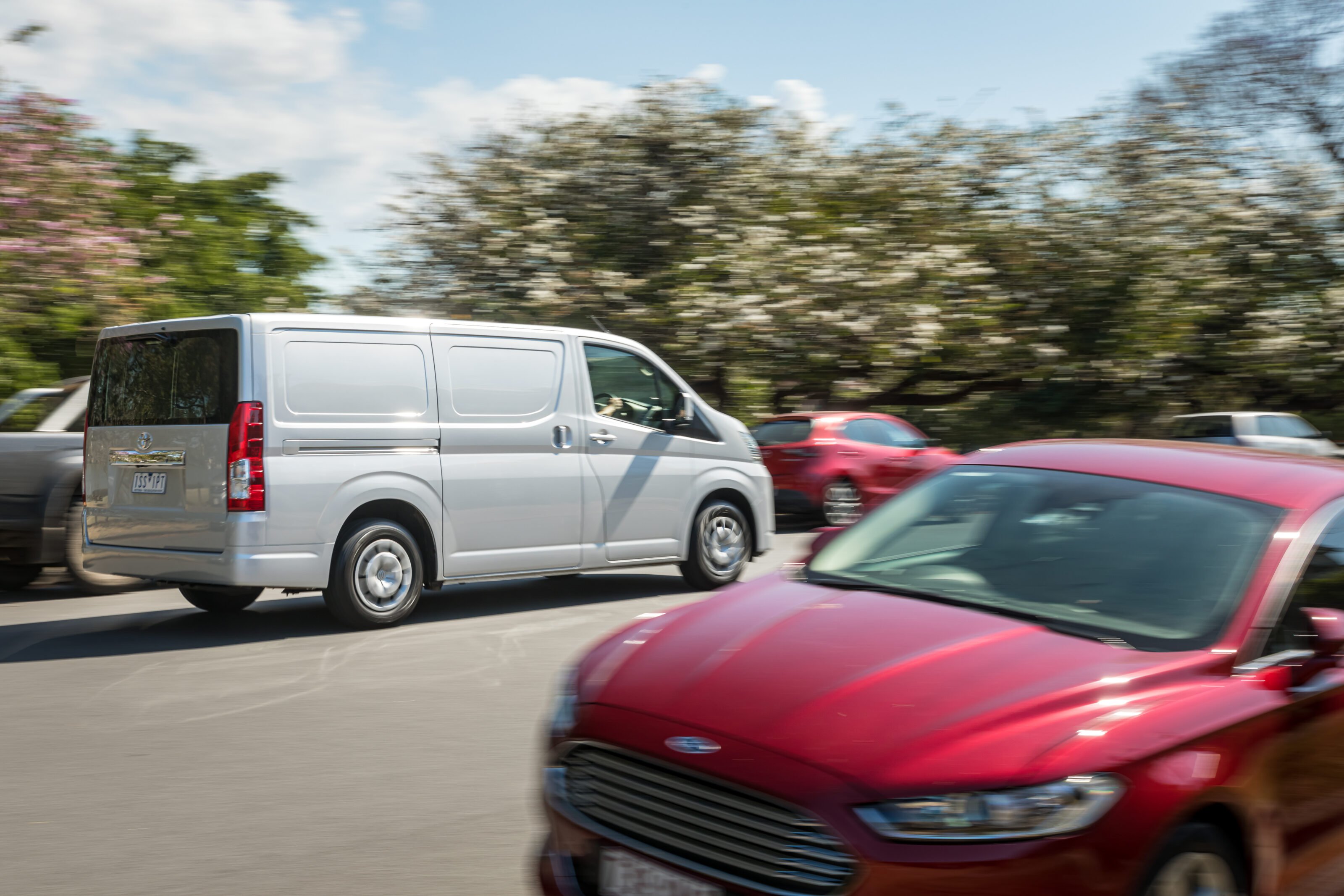
Automatic engine stop-start does its job to save a few millilitres of diesel here and there, but it didn’t shut off instantly like some systems. That’s a big plus and far less of an annoyance in stop-start traffic.
That little bonnet up front, by the way, has benefits beyond just visual appeal. Moving the motor forward frees up weight over the front axle, improving stability and handling, as well as access to the engine bay and cabin.
Front-end feel and general stability are miles ahead of the outgoing model, no doubt largely due to that semi-bonneted front-end and longer wheelbase.
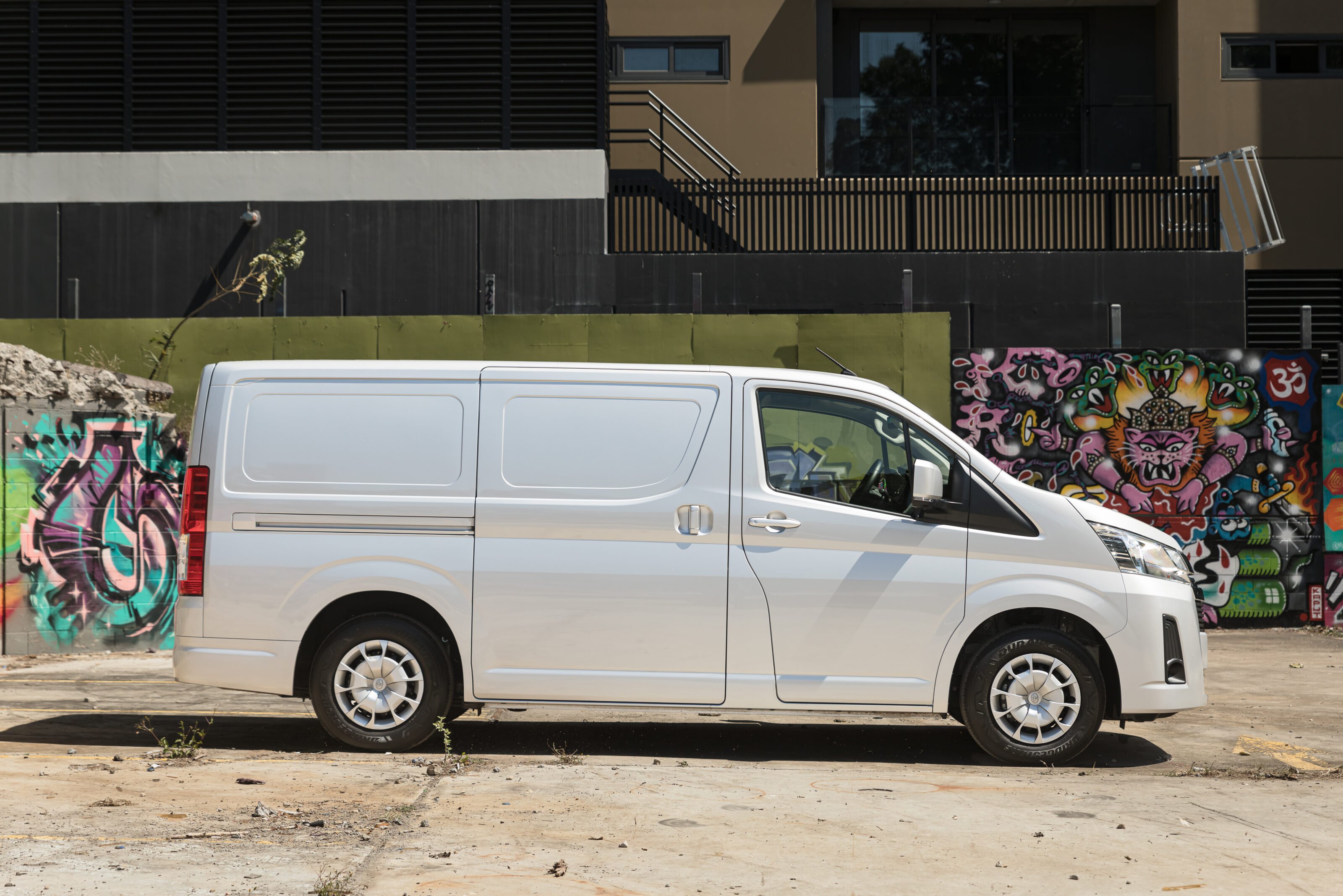
In true Toyota workhorse fashion, the interior feels appropriately drab. A simple, plastic interior makes for an easy wipe down and it’s a pleasant place to be overall, particularly for a commercial vehicle.
One beef we had with the interior finish was the white, or beige rather, portion of the dash. The off-white plastic is prone to smudges from greasy mitts so, if you’re likely to ingest the odd hot-box dimmy between deliveries, carry some wet wipes.
The cup holders are a slightly awkward size, too. While perfect for a tradie-suitable 1.5-litre water bottle, they’re utterly incapable of cradling a regular-sized hot coffee – to the point where iced long blacks were opted for over the standard scolding-hot equivalent. You can’t be too safe but, then again, perhaps Ice Break is the preferred caffeinated beverage for van duties.
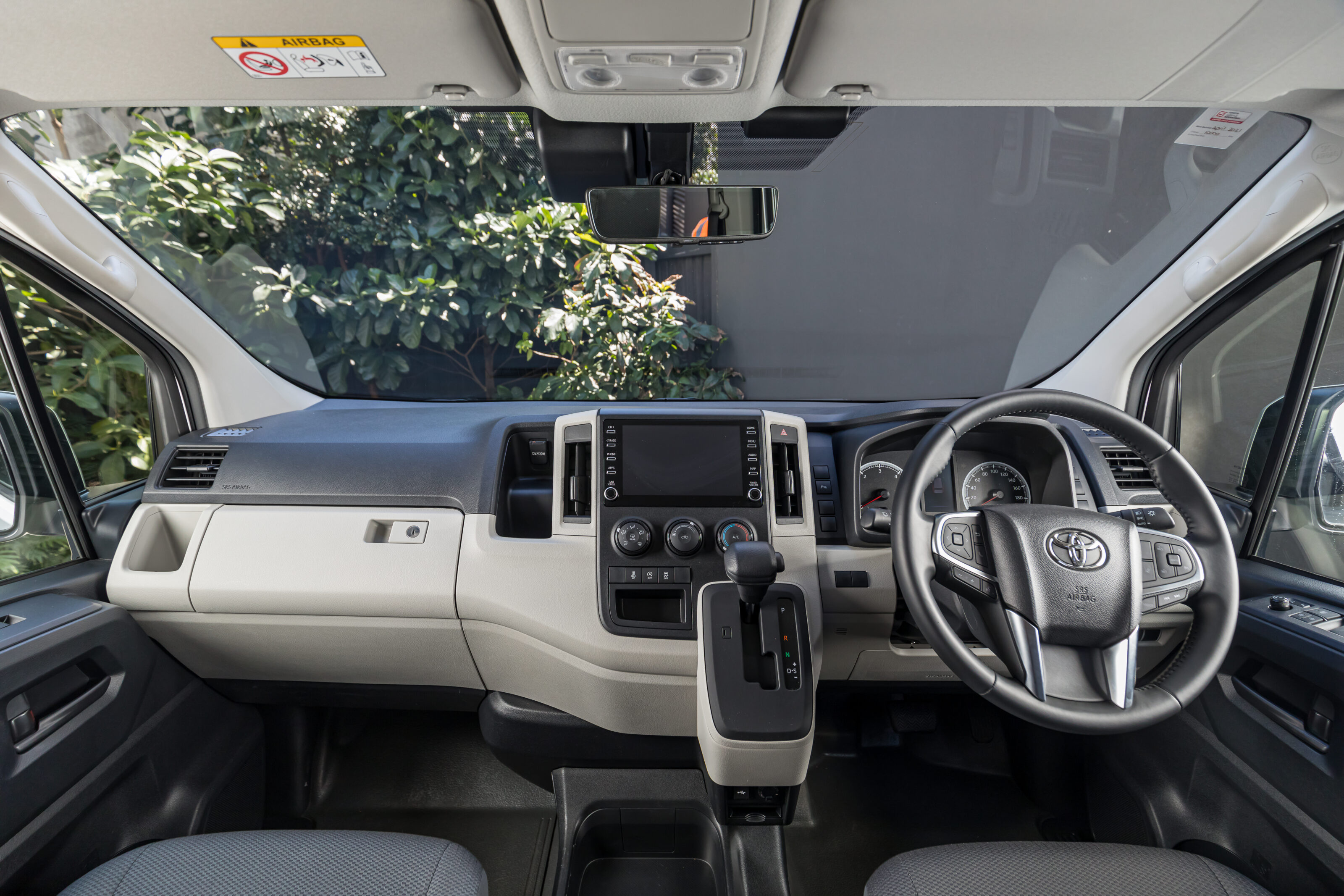
From an ergonomic and functionality standpoint, the interior is a step up over previous models, with a height-adjustable seat, tilt and telescopic steering wheel adjustability, and plenty of storage.
The ‘sitting over the steering wheel’ feeling you get in a cab-over van is gone, with car-like ergonomics offered in the new HiAce.
While calling the interior ‘drab’ may suggest it’s basic, it does bring plenty of safety and multimedia tech to the table that we enjoyed.
From an ergonomic and functionality standpoint, the interior is a step up, with a height-adjustable seat, tilt and telescopic steering wheel, and plenty of storage.
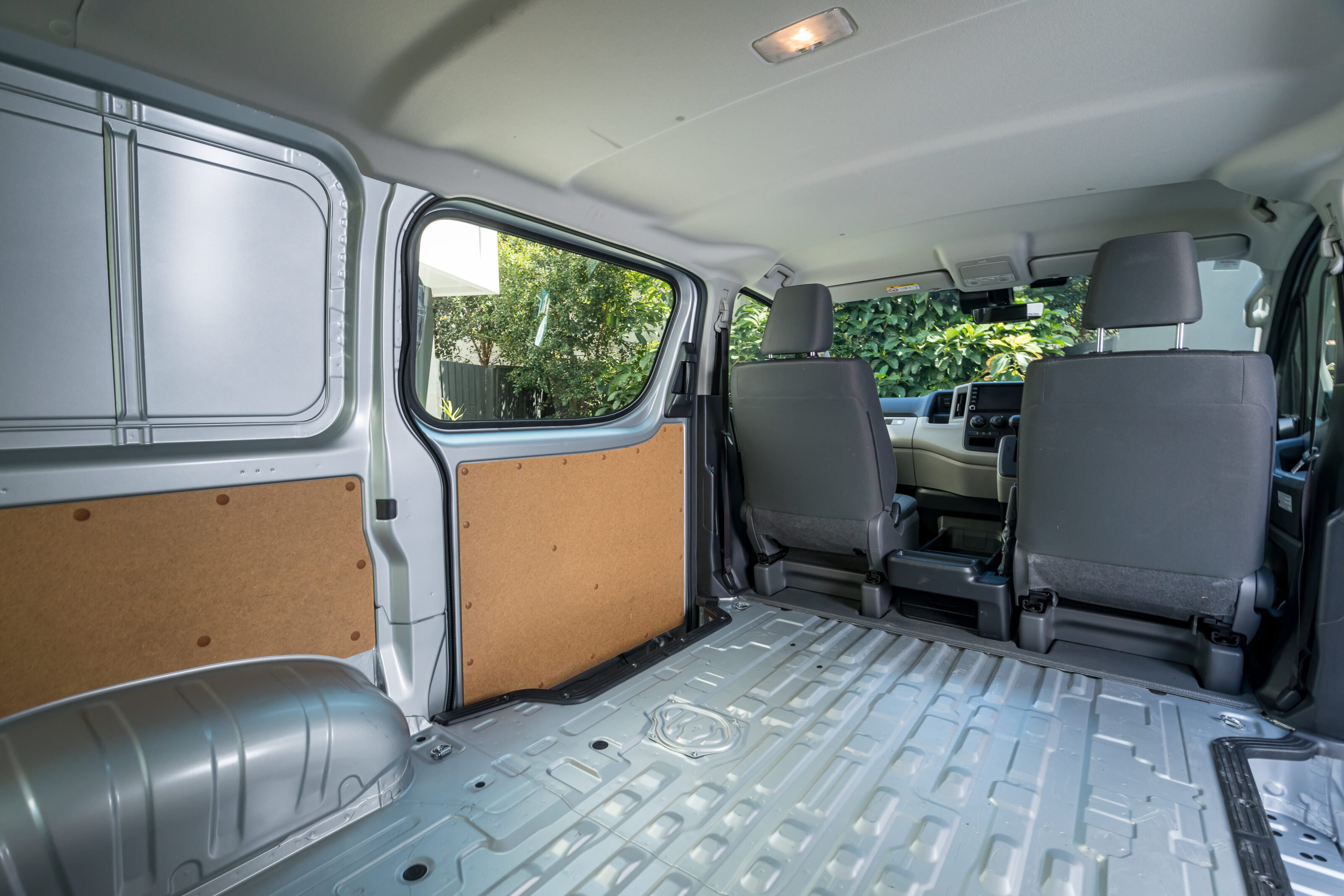
Toyota’s safety tech suite, dubbed ‘Toyota Safety Sense’, comes standard in the HiAce featuring a pre-collision safety system with pedestrian and daytime cyclist detection, lane departure alert with steering assist, road sign assist, blind-spot monitoring, rear cross-traffic alert, and auto high beam.
The pre-collision and lane departure assist work perfectly and aren’t overly intrusive like many other systems. There was no abrupt braking or misguided ‘Jesus, take the wheel’ lane departure assist scenarios.
A five-star ANCAP safety rating and seven airbags, including front side-curtain ‘bags, bring the van’s safety right up to par with competitors and add fleet buyer appeal.
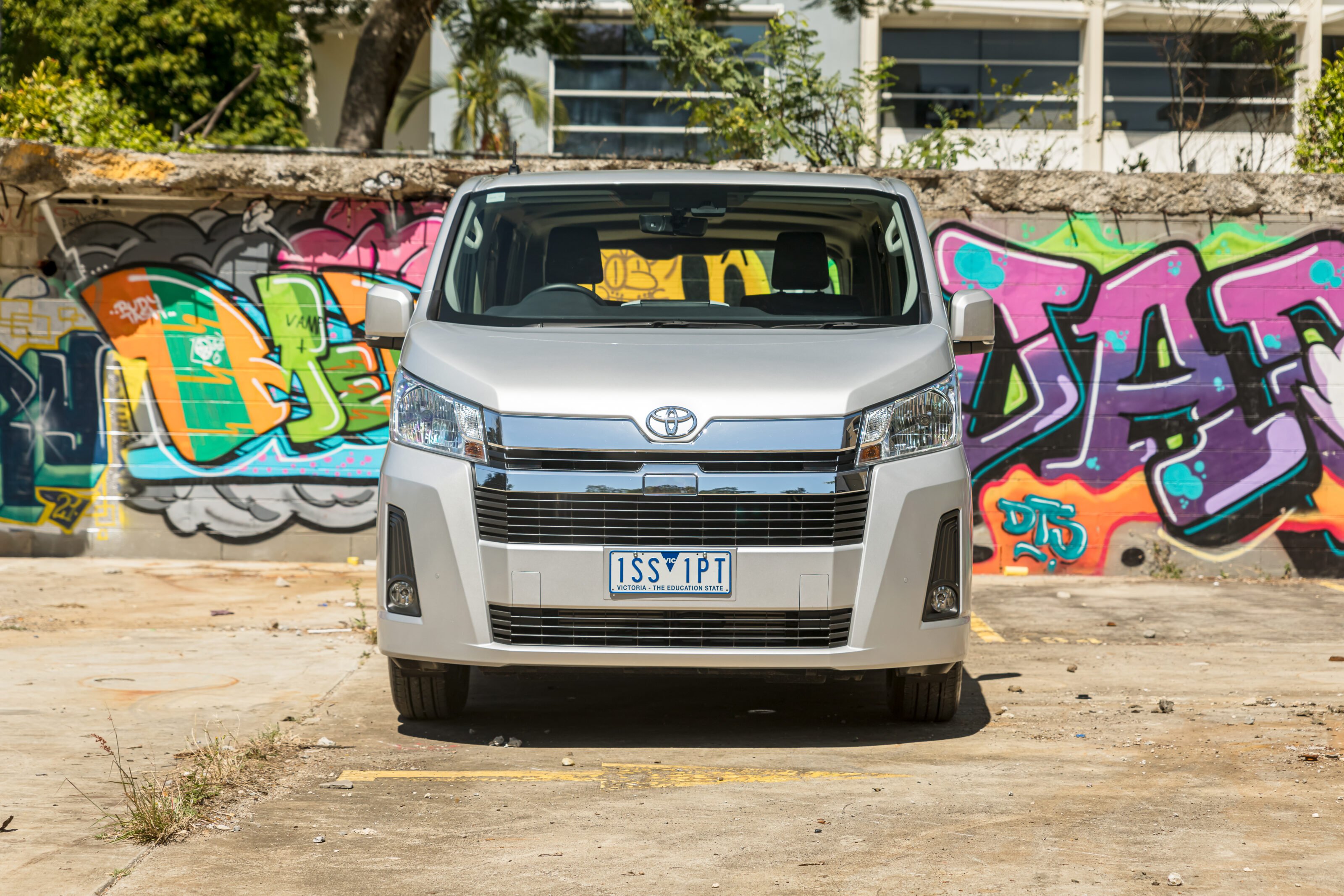
The HiAce does score a reversing camera, with front and rear parking sensors, but 360-degree cameras would have been a bonus.
Why? Because the standard camera distorts so badly at the edges, possibly due to the wide-angle lens used, that it became mandatory to cross-reference with mirrors. So, just remember your mirrors are your friend, because the confusing rear-view camera won’t be a good enough excuse for the boss if you slap a pole trying to park.
Apple CarPlay and Android Auto come standard, as well as a fantastic sat-nav that, if we were putting the van to delivery work, we’d use over the phone apps.
We’re used to a bit more audio bang for buck in 2021, the HiAce’s two-speaker system leaving a bit to be desired, but an aftermarket upgrade would solve this. It’s a van, after all.
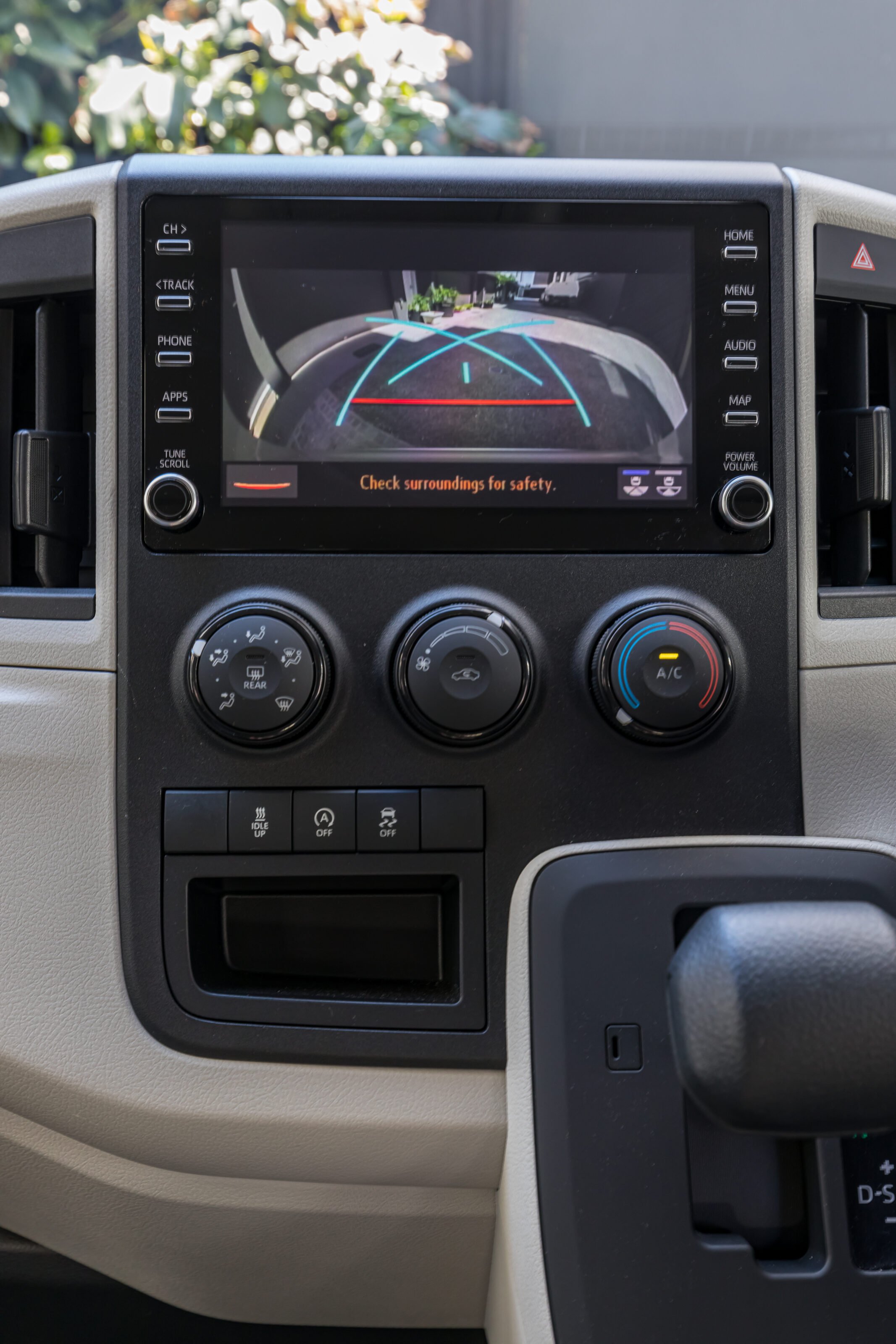
The lack of cargo barrier as standard makes it a must-tick extra at the dealer, for a couple of reasons.
Firstly, the aircon simply isn’t up to the task of cooling the entire cab and cargo areas. And secondly, pretty much all commercial vans run a cargo barrier so it should be standard fare given most of these vans will get put to work.
Above all else, it was the grunty powertrain that really stole the show across the kilometres we did – the rest just came together to complete the well-engineered puzzle.
Value and Ownership
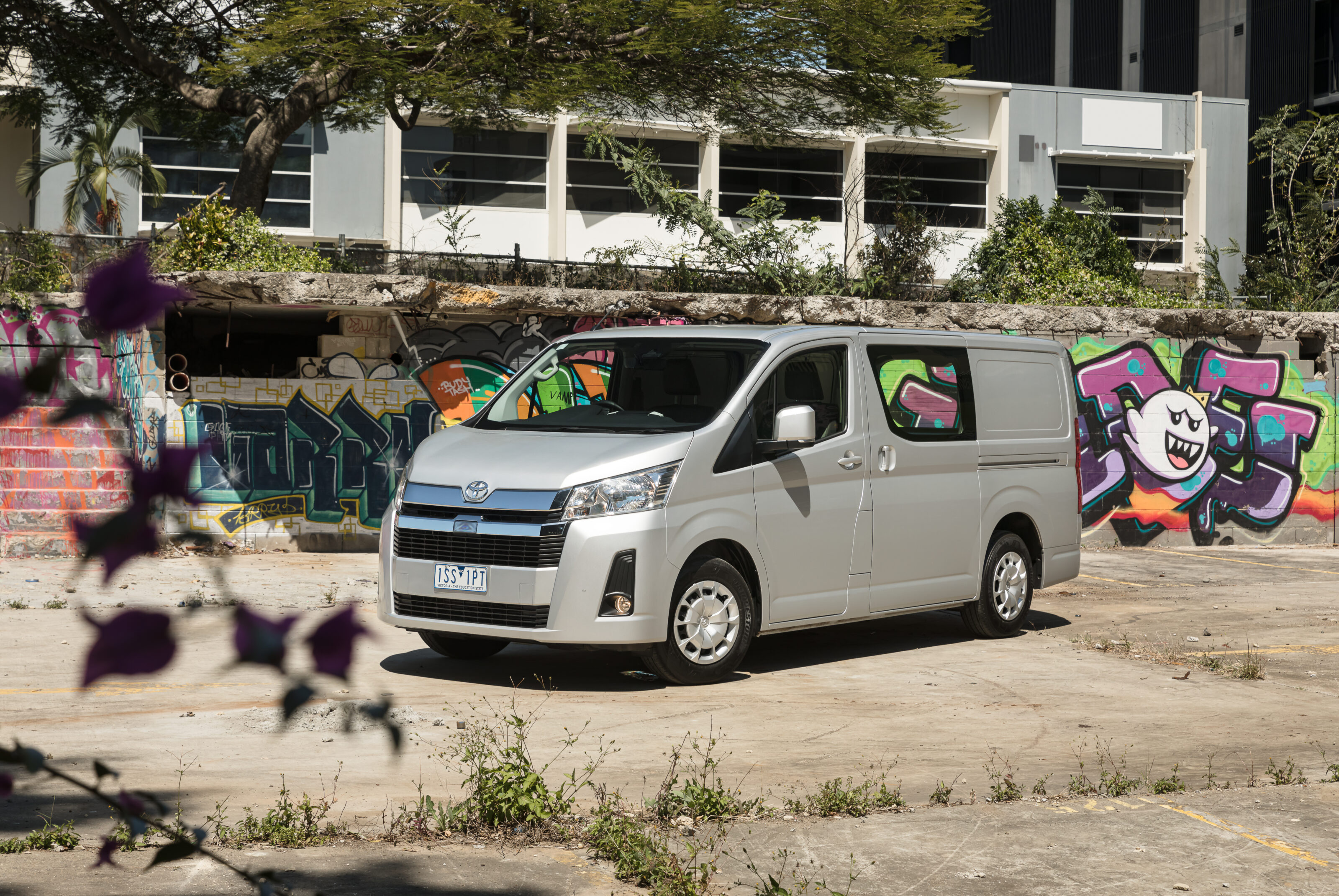
At $46,230 before on-roads, the LWB HiAce auto isn’t the cheapest mid-sized van, nor is it the exxiest, but what it offers is a proven class-leading package.
Toyota offers up a five-year unlimited-kilometre warranty, but do bear in mind the service intervals for all HiAce models are six months/10,000kms – a little more frequent than some of the competition.
The servicing frequency becomes less of an issue with Toyota’s Service Advantage, offering punters capped-price servicing for three years/60,000kms, at $240 a pop for the diesel.
By work van standards, aside from a few niggling gripes, the HiAce justifies its spot atop the mid-sized van sales ladder.
Australia’s favourite shoebox on wheels remains the dependable workhorse we’ve come to know and love. But now it does everything it’s always done well, even better.
2021 Toyota HiAce LWB specifications
| Body | Five-door van |
|---|---|
| Drive | Rear-wheel |
| Engine | 2.8-litre inline four-cylinder turbo-diesel |
| Transmission | Six-speed automatic |
| Power | 130kW @ 3400rpm |
| Torque | 450Nm @ 1600-2400rpm |
| Weight | 2220kg |
| L/W/h | 5265/1950/1990mm |
| Wheelbase | 3210mm |
| Tracks (f/r) | 1670mm |
| Turning circle | 11m |
| Cargo space length | 2530mm |
| Cargo space width | 1760mm |
| Cargo space height | 1340mm |
| Cargo Space volume | 6200L |
| Payload | 1095kg |
| Towing capacity (braked) | 1500kg |
| Fuel tank capacity | 70L |
| Fuel Economy (claimed) | 8.2L/100km |
| Fuel Economy (as tested) | 12.8L/100km |
| Suspension | McPherson strut, stabiliser bar (f);leaf spring, rigid axle (r) |
| Steering | Hydraulically-assistedrack and pinion |
| Brakes | 296mm ventilated discs (f); 320mm ventilated discs (r) |
| Wheels | 16 x 7J steel all-round (full-size spare) |
| Tyres (f/r) | 215/70R16 |
| Price | $46,230 (plus on-road costs) |
Score breakdown
Things we like
- Rear-wheel drive, a rarity in the mid-sized van segment
- Increased cargo capacity
- Punchy 2.8-litre turbo-diesel shared with HiLux
Not so much
- Reversing camera distorts at edges
- Two-speaker stereo feels underspecced
- Cup holders suitable for 1.5-litre bottles, less than ideal for coffee or cans




